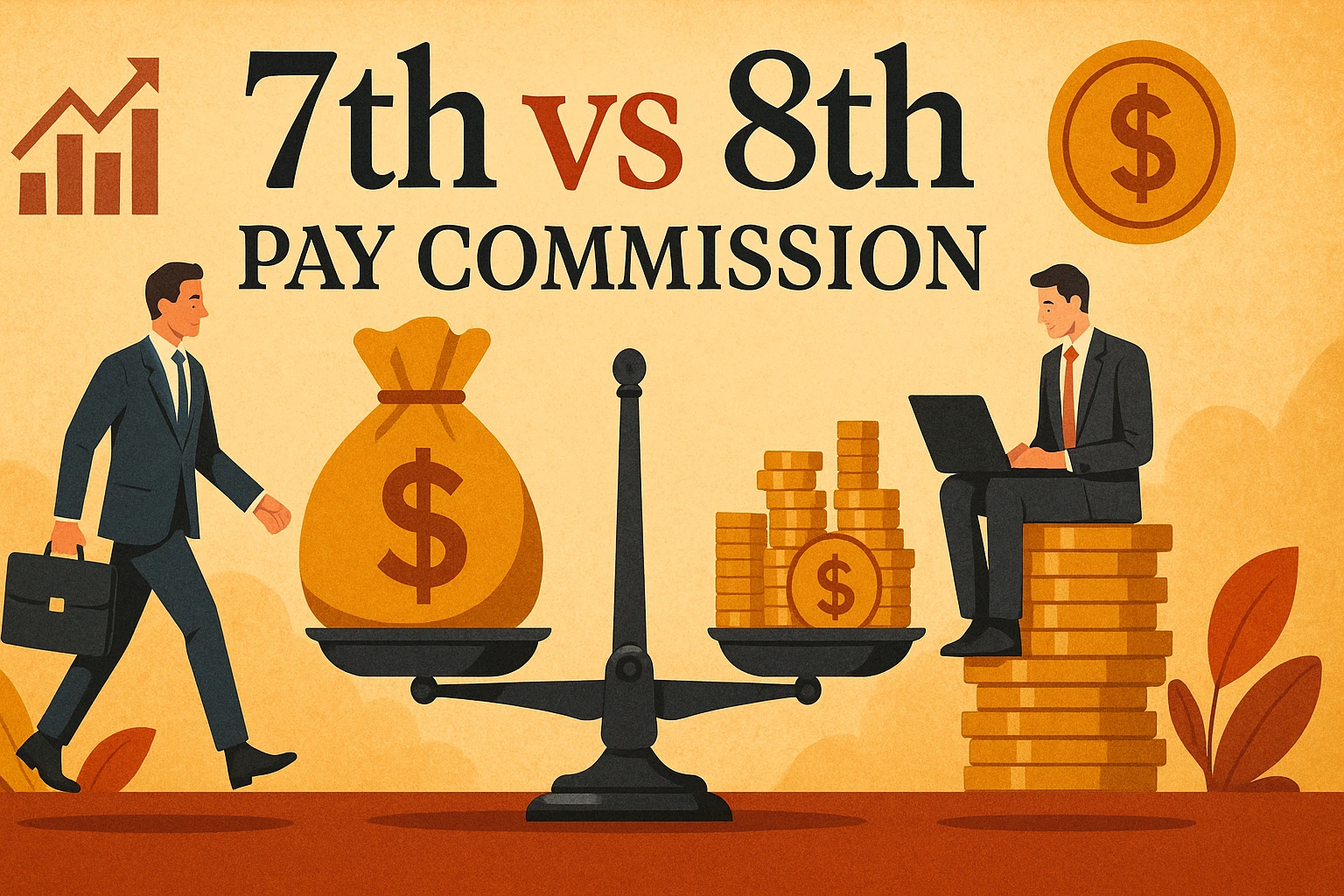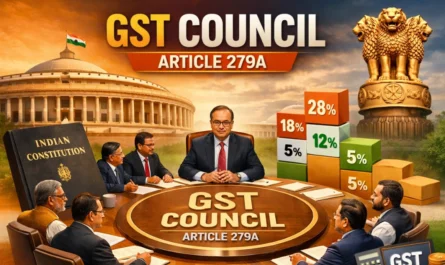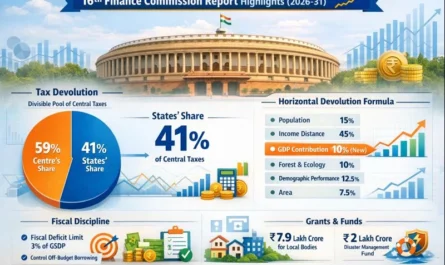The 8th Pay Commission is expected to be constituted by the Government of India around 2024–2025 to revise the salary structure, allowances, and pensions of central government employees. Pay Commissions are typically established every 10 years to ensure government salaries keep pace with inflation, cost of living, and economic growth. The 8th Pay Commission will replace the 7th Pay Commission, which was implemented in 2016. This topic holds significance for UPSC aspirants as it impacts public expenditure, fiscal policy, and administrative reforms.
8th Pay Commission
The 8th Pay Commission is anticipated to be implemented around January 2026, marking a decade since the last revision. It will cover over 50 lakh central government employees and 65 lakh pensioners, offering changes in pay, pension, and allowances. The commission may recommend a new pay matrix, increased minimum basic pay, and adjustments in fitment factor. Its proposals will directly influence fiscal deficit, expenditure planning, and union-state financial relations.
8th Pay Commission Overview
The 8th Pay Commission plays a pivotal role in ensuring fair remuneration for government employees, maintaining equity with private sector wages, and improving morale in public service. It also serves as a tool for economic stimulation and demand creation through enhanced disposable incomes.
8th Pay Commission Overview | |
| Aspect | Details |
| Commission Name | 8th Pay Commission |
| Likely Setup | 2025 or 2026 |
| Implementation Year | Expected by 1st January 2026 |
| Replaces | 7th Pay Commission (implemented in 2016) |
| Beneficiaries | 50+ lakh employees and 65+ lakh pensioners |
| Type | Central Sector Advisory Commission |
| Official Website | https://dopt.gov.in/ |
8th Pay Commission Implementation Date
The 8th Pay Commission is expected to be implemented from 1st January 2026, maintaining the 10-year cycle followed by previous commissions. Although the government has not issued a formal notification, unions and staff associations have started raising demands for its constitution. Usually, a pay commission takes 18 to 24 months from formation to final implementation. The final rollout depends on central cabinet approval and fiscal conditions during the 2025-26 budget cycle.
8th Pay Commission Salary Structure
The 8th Pay Commission is expected to bring significant changes to the salary structure of central government employees in India. Scheduled to be implemented around 2026, the commission will revise pay scales, allowances, and pensions based on current economic conditions, inflation rates, and living standards. One of the major expectations is the introduction of a new fitment factor, likely between 3.0 to 3.68, which will directly impact the basic pay across various levels. The revised structure will also focus on rationalizing pay anomalies and improving financial well-being of over 50 lakh central employees and 65 lakh pensioners. Below is the anticipated 8th Pay Commission Pay Matrix Table based on current projections and expert analysis:
8th Pay Commission Salary Structure | |||
| Pay Level | Existing Basic Pay (7th CPC) | Expected Fitment Factor | Revised Basic Pay (8th CPC) |
| Level 1 | ₹18,000 | 3.0 | ₹54,000 |
| Level 4 | ₹25,500 | 3.0 | ₹76,500 |
| Level 6 | ₹35,400 | 3.0 | ₹1,06,200 |
| Level 7 | ₹44,900 | 3.0 | ₹1,34,700 |
| Level 10 | ₹56,100 | 3.0 | ₹1,68,300 |
| Level 13 | ₹1,23,100 | 3.0 | ₹3,69,300 |
What is Fitment Factor in 8th Pay Commission?
The fitment factor in the 8th Pay Commission is a key multiplier used to revise the basic pay of central government employees from the existing pay scale to the new one. It essentially determines how much the current basic salary will be increased under the new pay commission.
Formula: Fitment Factor = Revised Basic Pay / Existing Basic Pay
Expected Fitment Factor in 8th Pay Commission
Though the government has not officially announced it yet, experts predict that the fitment factor may range between 3.0 and 3.68, considering inflation, rising cost of living, and demands from employee unions. This factor is crucial as it directly impacts not only basic pay but also linked components like Dearness Allowance (DA), House Rent Allowance (HRA), Travel Allowance (TA), and pension. Hence, it plays a pivotal role in determining the overall salary hike for lakhs of central government employees and pensioners.
Expected Fitment Factor in 8th Pay Commission | |||
| Pay Commission | Year of Implementation | Fitment Factor | Minimum Basic Salary |
| 1st CPC | 1946 | Not Applicable | ₹35 |
| 2nd CPC | 1959 | Not Applicable | ₹80 |
| 3rd CPC | 1973 | ~2.3× (approx.) | ₹196 |
| 4th CPC | 1986 | ~2.57× | ₹750 |
| 5th CPC | 1996 | 3.6× | ₹2,550 |
| 6th CPC | 2006 | 1.86× | ₹7,000 |
| 7th CPC | 2016 | 2.57× | ₹18,000 |
| 8th CPC (Expected) | ~2026 | 3.0 – 3.68× | ₹54,000 – ₹66,240 (expected) |
8th Pay Commission Recommendations (Expected)
The 8th Pay Commission is likely to propose wide-ranging reforms to address gaps from the 7th CPC, adapt to inflation, and align with modern workforce expectations. These recommendations will not only affect pay but also pension reforms, allowances, performance-based pay models, and job classification structures.
8th Pay Commission Recommendations (Expected) | |
| Area of Recommendation | Expected Proposal |
| Minimum Basic Pay | Likely increase from ₹18,000 to ₹26,000-₹30,000 |
| Fitment Factor | Expected hike from 2.57x to 3.00x |
| Pension Revision | Rationalized formula for pre and post-2004 retirees |
| DA Merger | Integration of DA with basic pay at revised threshold |
| Allowances | Revision in HRA, TA, medical, risk, and field allowances |
| Performance-Based Pay | Introduction of productivity-linked pay model |
8th Pay Commission – Expected Changes
The 8th Pay Commission will not only revise the pay structure but also influence various policy dimensions like federal transfers, defence pensions, and tax compliance. This pay revision will ripple across state governments, public sector units, and autonomous institutions, leading to broader economic effects. The Commission is also expected to emphasize gender equity in pay, digital HRMS adoption, and transparent performance grading.
8th Pay Commission – Expected Changes | |
| Area | Expected Change |
| Salary Structure | Simplified pay levels and bands |
| Pension System | Better harmonization between NPS and OPS models |
| Administrative Impact | Improved morale, better retention in civil services |
| Fiscal Impact | Increase in revenue expenditure; pressure on fiscal deficit |
| State Finances | States may replicate pay hikes in their own commissions |
| Consumption Pattern | Boost to demand via increased disposable income |
8th Pay Commission Salary Calculator
The 8th Pay Commission Salary Calculator helps central government employees estimate their revised basic pay based on expected fitment factors. Using your current 7th CPC basic salary and a projected multiplier (fitment factor ranging from 3.0 to 3.68), this calculator gives a quick preview of your possible new salary after the 8th Pay Commission implementation in 2026.
Also Read: Preamble of the Indian Constitution
Steps to Calculate 8th Pay Commission Salary
To calculate your expected salary under the 8th Pay Commission, follow these simple steps:
Step-by-Step Guide:
Step 1: Know Your Current Basic Pay
- Check your current Basic Pay as per the 7th Pay Commission Pay Matrix (excluding DA, HRA, etc.).
Step 2: Choose the Expected Fitment Factor
- Use one of the projected fitment factors under the 8th Pay Commission:
- 3.0 (minimum expected)
- 3.5 (demanded by unions)
- 3.68 (highest projected)
Step 3: Apply the Formula
- Use the formula:
Revised Basic Pay = Current Basic Pay × Fitment Factor
Step 4: Calculate the Revised Basic Pay
- Multiply your current basic pay with the selected fitment factor.
Step 5: Estimate Gross Salary (Optional)
- Add expected Dearness Allowance (DA), House Rent Allowance (HRA), and Travel Allowance (TA) to the revised basic pay to get an estimate of your total salary.
Example Calculation
- Current Basic Pay: ₹25,500
- Fitment Factor: 3.5
Revised Pay = ₹25,500 × 3.5 = ₹89,250
8th Pay Commission FAQs
What is the 8th Pay Commission?
It is a central advisory body expected to revise salaries, pensions, and allowances of central government employees by 2026.
When will the 8th Pay Commission be implemented?
Likely by 1st January 2026, though official notification is still awaited.
What is the expected minimum basic pay under the 8th Pay Commission?
Likely to be revised from ₹18,000 to around ₹26,000–₹30,000.
Who are the beneficiaries of the 8th Pay Commission?
Around 50 lakh central govt employees and 65 lakh pensioners.
Why is the 8th Pay Commission important for UPSC?
It links topics like fiscal policy, administrative reform, governance, and welfare state—all part of GS II & III.







